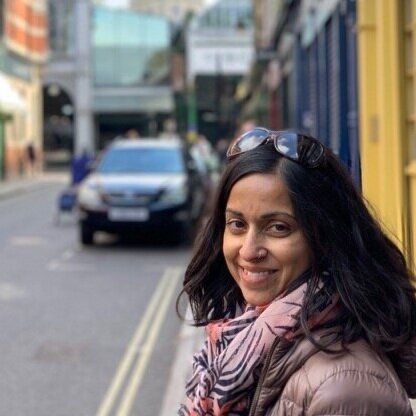Lesh Karan: 'Our Mango Tree'
Lesh Karan reading ‘Our Mango Tree’
My maan, baap, bhaee and bahan, and I crammed under the double bed that belonged to my sister and me. We had dragged blankets and pillows with us to buffer the concrete floor. Outside gale-force winds were howling and whirling at unfathomable speeds. Inside we tried to be louder with our cyclical chanting of Hare Rama, entreating a greater force to intercede.
After what seemed like ghante, but actually were minutes, the winds died down. We crawled out to assess the aftermath. Standing in an eerie vacuum, my dil paused for an indeterminable period, while my presence fled into yaadash.
The tree’s trunk fits snugly into our three-kid hug. My siblings and I climb her almost daily. We sit in her lap – like that of goddess Shakti’s – and dangle off her limbs.
Each season, she is endowed and generous with her gifts, which we appreciate whether unripe or juicy. The unripe ones we peel and slice into batons with a paring knife, and toss with mirch and namak, salivating with anticipation. We pick baltee-fuls, too, and sit with mum, halving, pitting and drying the fruit in the tropical sun, to be spiced and salted into mum’s infamous achaar.
The ripe aam we pluck and smoosh into our mouths. The pulp decorates our cheeks and chins, while the russ dribbles down our wrists into the nooks of our elbows. We use our daant to clamp onto the skin that we peeled off with our ungaliyaan – then pull at it, teeth scraping off the filaments.
Our tree bears more phal than our greed can handle. A bounty remains, turning blush-golden and juicy over weeks, some with dark spots on their skin, which join if we don’t get to them fast enough. We can never get to all the pukka ones in time, but risk julaab trying.
When we are not on the tree, we are under her. Her branches spread vast, partially shading our tin ghar and almost all our front yard. My father, a mechanical engineer, built his fishing boat with his haath in the cool of her shadow. He laboured over months, sanding the hull and applying fibreglass with slow, rhythmic strokes, like an extended pooja asking for her protection when he’s at sea.
Of her one-hundred-plus years on the planet, hamaareaam ka ped lived with us for five. In January 1985 she withstood cyclone Eric but was spliced lengthways by cyclone Nigel three days later.
To this day I believe our tree heard our incantations as she descended towards the house and came to lie on either side, protecting her parivaar in the cradle of her halves.
Glossary
maan, baap, bhaee and bahan: mother, father, brother and sister
Hare Rama: Hindu chant/prayer
ghante: hours
dil: heart
yaadash: remembering / memory
Shakti: a Hindu goddess; shakti also means power
mirch: chilli
namak: salt
baltee: bucket
achaar: pickle
aam: mango
russ: juice/nectar
daant: teeth
ungaliyaan: fingers
phal: fruit
pukka: ripe
julaab: diarrhoea
ghar: house
haath: hands
pooja: prayer
hamaare aam ka ped: our mango tree
parivaar: family
Lesh Karan was born in Fiji, has Indian genes and lives in Melbourne. She has worked as a pharmacist, medical writer and digital content specialist, but fancies herself as a creative writer and poet. Lesh wrote her first poem in May 2018. Her poetry has been published in the Australian Multilingual Writing Project and Cordite Poetry Review.

